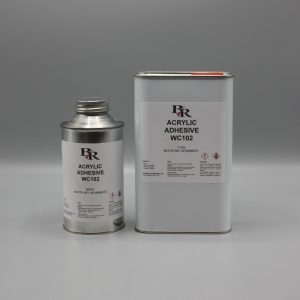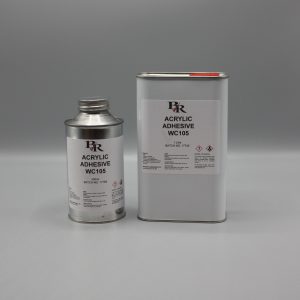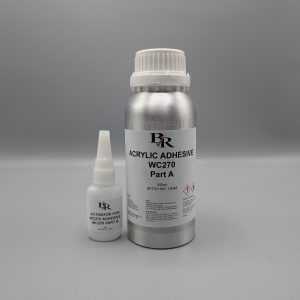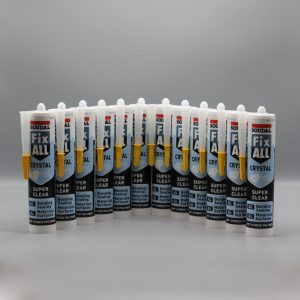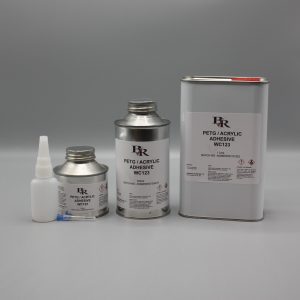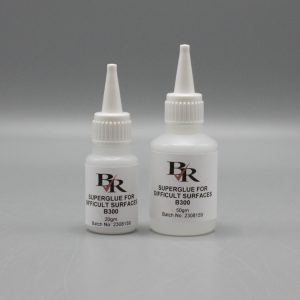Plastic Adhesives
The key to getting the perfect bond with plastic is knowing exactly what type of plastic you are working with. Consequently, We have been working for many years with our local plastic moulders and fabricators to provide an extensive range of adhesives for their industries.
A quick and easy way for you to distinguish the plastic is through the number within it’s recycling symbol. To help you we’ve listed some of the codes you might find and the appropriate adhesive for them; however, if you are still unsure feel free to contact us, we are happy to help.
| Recycling number | Plastic type | Adhesive codes suitable |
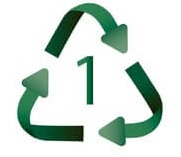 | PETG | WC123, Fix All Crystal |
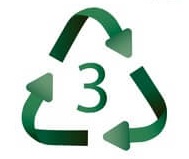 | PVC | Fix All Crystal, B300 |
| Styrolux | WC123 | |
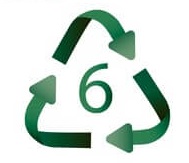 | Polystyrene | Fix All Crystal, B300 |
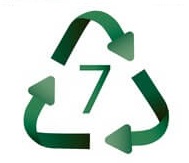 | Acrylic | Fast cure: WC102, WC123 | Slow cure: WC105, WC270 |
| ABS | Fix All Crystal | |
| Polycarbonate | Fix All Crystal, B300, WC105 |
Showing all 6 results
-

Acrylic Adhesive WC102
From: £25.08 Select options This product has multiple variants. The options may be chosen on the product page -

Acrylic Adhesive WC105
From: £31.15 Select options This product has multiple variants. The options may be chosen on the product page -

Acrylic Adhesive WC270
£61.72 Add to basket -

MS Polymer Sealant Fix All Crystal Clear – Box of 12
£117.60 Add to basket -

PETG / Acrylic Adhesive – WC123
From: £18.06 Select options This product has multiple variants. The options may be chosen on the product page
Plastic adhesives explored
Our range of plastic glues is suitable for many applications, from fixing plastic items and adhering things to plastic surfaces to soft plastics.
Let’s explore this range of plastic adhesives in more detail and help you find the best glue for you.
Acrylic Adhesive – WC102
Acrylic adhesive WC102 is a liquid adhesive that is quick drying and is widely used in the Point of Sale and Sign Industries. As it is very thin it will “wick” into cracks and into pre-mated “L” and “T” sections when creating boxes or displays. It is fast cure and will require application by syringe or dosing tip.
Available in the following sizes:
- 500ml Acrylic Adhesive – WC102
- 1 Litre Acrylic Adhesive – WC102
Acrylic Adhesive – WC105
WC105 acrylic adhesive can be used across a wide range of industries and applications where the rapid bonding of acrylic and some other plastics is required.
This acrylic adhesive is more viscous than the WC102 and as such takes longer to cure. It is a weld cement that is based on acrylic so it is perfectly designed to bond acrylic to itself.
As a result, this plastic glue is available in the following sizes:
- 500ml Acrylic Adhesive – WC105
- 1 Litre Acrylic Adhesive – WC105
MS Polymer Sealant Fix All Crystal Clear Box of 12
MS Polymer Fix All Crystal Clear Sealant is a high quality general-purpose neutral, elastic, one-component construction joint and adhesive sealant based on SMX-Polymer.
This polymer-based sealant can be used for sealing and bonding in the building and construction industry particularly in sanitary and kitchen areas as it resists mould growth. It provides a structural bond in vibrating constructions and will bond most building substrates. This sealant also has great resistance to water, aliphatic solvents, mineral oils, grease, diluted inorganic acids and alkalis.
Available in the following sizes:
- 12 x 290ml MS Polymer Sealant Fix All Crystal Clear
PETG / Acrylic Adhesive – WC123
This PETG / acrylic adhesive is a fast-curing, clear cement, specifically formulated to bond PETG and acrylic to itself and other substrates.
Available in the following sizes:
- 250ml PETG / Acrylic Adhesive – WC123
- 500ml PETG / Acrylic Adhesive – WC123
- 1 Litre PETG / Acrylic Adhesive – WC123
Superglue for Difficult Surfaces – B300
B300 superglue is a low-to-medium viscosity, fast curing, single-component cyanoacrylate adhesive, which can be used for virtually any type of fastening job. It has been specially formulated for difficult-to-bond materials. B300 superglue can even maintain a rapid fixture time on acidic surfaces such as wood, leather and dichromate metals.
B300 precision plastic glue also has a semi-clear container that allows you to see the glue level visibility that is left in it so you know when you are running low. It can even maintain a rapid fixture time on acidic surfaces, making it ideal as a wood glue and for use on leather and dichromated metals as well. This makes it a good product to consider when trying to fix broken toys, plastic models, and the like.
Available in the following sizes:
- 20g Superglue for Difficult Surfaces – B300
- 50g Superglue for Difficult Surfaces – B300
Acrylic Adhesive – WC270
This Acrylic Adhesive WC270 is a two part acrylic cement that dries clear, has a thicker viscosity than the WC105 and is specifically formulated for bonding / fabricating / cementing cast acrylic sheet (Perspex) and components.
WC270 acrylic adhesive can be used across a wide range of industries and applications where the bonding of acrylic to itself and other materials such as wood is required.
Available in the following sizes:
- 500ml Part A and 25ml Part B – WC270
Bonding
Plastic adhesive is a bonding solution that has become increasingly popular in recent years, especially because many of these glues have a low odour. It offers several benefits, including versatility, cost-effectiveness, ease of use, improved aesthetics, and increased durability. Many of them are also non-flammable, giving you the perfect solution for what you are trying to fix or repair.
Versatility
One of the primary benefits of plastic adhesive is their versatility, as these can tend to be strong glues that can be used to bond a variety of different plastic materials together, providing an ultra-strong bond. This means that plastic adhesive can be used in many different industries, including automotive, aerospace, construction, and electronics. Its ability to bond with different types of plastics also makes it an ideal solution for recycling plastic materials. For the best results, though, make sure that the area you are trying to bond is both clean and, in many cases, dry as well, as this will give you the best experience and bond possible.
Cost-Effectiveness
Plastic adhesive is also a cost-effective solution for bonding plastics. Adhesive glue, bonding, for instance, can often be a more cost-effective option compared to other methods of joining plastic, such as welding or mechanical fastening. This is because adhesive bonding typically requires less specialized equipment and training and can often be done with simple tools.
Ease of Use
Another benefit of plastic adhesive is its ease of use. Adhesive bonding is a relatively simple process that does not require specialized equipment or training. The surface of the plastic parts being bonded should be clean and dry, and the adhesive should be applied according to the manufacturer’s instructions. Once applied, the adhesive typically cures within a few minutes or hours, depending on the specific adhesive and conditions.
Improved Aesthetics
Plastic adhesive can also create a seamless bond that improves the overall appearance of the plastic parts being joined. Unlike other bonding methods, such as mechanical fastening, plastic adhesive does not leave visible joints or screws that can detract from the appearance of the finished product.
Increased Durability
The use of this multi-purpose plastic adhesive can create a high-strength bond for a wide range of plastics – including flexible plastics and rigid plastics – that is able to withstand various environmental factors, such as temperature changes and exposure to chemicals or moisture. This is particularly important in industries such as automotive and aerospace, where durability is critical.
How to Select the Right Plastic Adhesive
There are a variety of plastic adhesives available on the market, including cyanoacrylate, weld cement, sealant, and acrylic adhesives. Each type of adhesive has its own strengths and weaknesses, so it is important to select the right one for your specific application.
What types of plastics can be bonded with plastic adhesive?
Plastic adhesives can be used to bond a variety of plastic materials, including polyethene, polypropylene, polystyrene, PVC, and ABS.
What factors should I consider when selecting a plastic adhesive?
Factors to consider when selecting a plastic adhesive include the type of plastic being bonded, the strength and durability of the bond required, the environmental conditions the bond will be exposed to, and the desired cure time.
How do I apply plastic adhesive?
The specific application process for plastic adhesive can vary depending on the adhesive and the plastic being bonded. Generally, the surface should be clean and dry, and the adhesive should be applied according to the manufacturer’s instructions.
How long does it take for plastic adhesive to cure?
The cure time for plastic adhesive can vary depending on the adhesive and the conditions in which it is used. Some adhesives may cure in a matter of seconds, while others may take several hours or more.
Is plastic adhesive safe to use?
When used according to the manufacturer’s instructions, plastic adhesive is generally safe to use. However, some adhesives may contain potentially harmful chemicals, so it is important to follow appropriate safety precautions, such as wearing gloves and working in a well-ventilated area.
Can plastic adhesive be used for outdoor applications?
Yes, plastic adhesive can be used for outdoor applications. However, it is important to select an adhesive that is designed for the specific environmental conditions it will be exposed to. UV exposure, temperature changes, and exposure to moisture or chemicals can all affect the performance of plastic adhesives.
Can plastic adhesive be used to bond dissimilar materials?
Some plastic adhesives, due to their bond strength, allow you to adhere dissimilar materials, such as plastic to metal or plastic to glass. However, it is important to select an adhesive that is designed for the specific materials being bonded, as different adhesives may have different bonding capabilities.
Are there any safety concerns when using plastic adhesive?
When used according to the manufacturer’s instructions, plastic adhesive is generally safe. However, some adhesives may contain potentially harmful chemicals, so it is important to follow appropriate safety precautions, such as wearing gloves and working in a well-ventilated area. It is also important to avoid contact with the skin or eyes and seek medical attention if any adverse reactions occur.
If you need to break the bond apart later, many of these can be done using solvent cleaners or even nail polish remover.
Not sure if Plastic Adhesives are right for your requirements?
If you are not sure if these are the right products for you and your requirements, please contact our customer service team via our contact form or via our phone number to discuss your requirements and our customer support can then point you in the right direction for the strongest glue for you.

